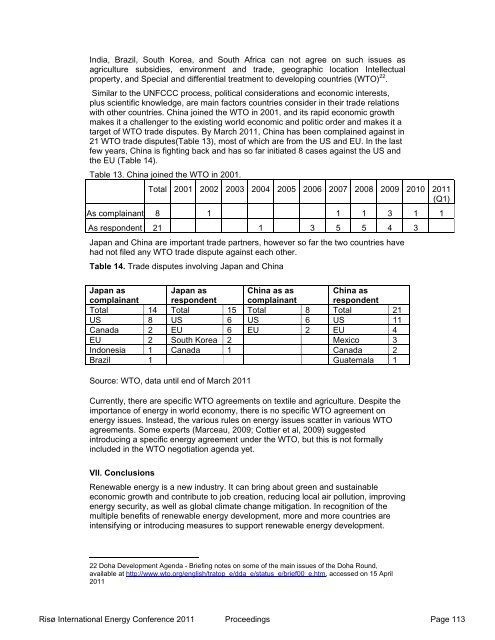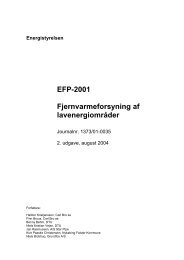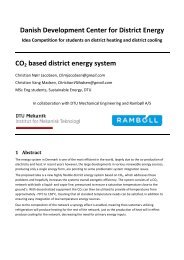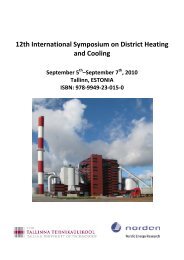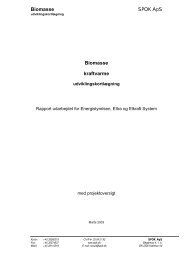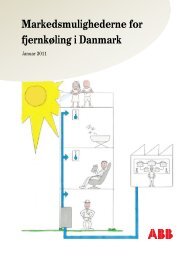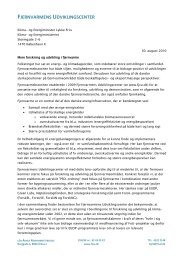- Page 1 and 2:
Energy Systems and Technologies for
- Page 3 and 4:
ContentsSessions overview 1Programm
- Page 5 and 6:
sessions overview08:00-09:00Coffee
- Page 7 and 8:
11:00 - 12:30 session 6A - Bioenerg
- Page 9 and 10:
ContactSustainable Energy, Technica
- Page 11 and 12:
Penetration of new energy technolog
- Page 13 and 14:
how decisions are made and by whom
- Page 15 and 16:
(9) is the logaritimic expansion of
- Page 17 and 18:
(16)we may finally write Eq(14) in
- Page 19 and 20:
Table 1: Fast track cases for new r
- Page 21 and 22:
Peterka V. Macrodynamics of technol
- Page 23 and 24:
Growth in clean and reliable energy
- Page 25 and 26:
Conclusion - an ambitious vision an
- Page 27 and 28:
"Spurring investments in renewable
- Page 29 and 30:
Integrating climate change adaptati
- Page 31 and 32:
transport, and finance. Energy prov
- Page 33 and 34:
northern South America, the Caribbe
- Page 35 and 36:
Table 1: Energy system adaptation s
- Page 37 and 38:
More generally, a number of no- or
- Page 39 and 40:
6 ReferencesADB, 2005. Climate proo
- Page 41 and 42:
Sailor, D.J., Smith, M., Hart, M.,
- Page 43 and 44:
Factors affecting stakeholder perce
- Page 45 and 46:
Another study conducted in Japan wa
- Page 47 and 48:
4 The effect of information on stak
- Page 49 and 50:
Furthermore, communication to stake
- Page 51 and 52:
Shackley S, McLachlan C, Gough C (2
- Page 53 and 54:
Figure 1: Potential CO 2 storage si
- Page 55 and 56:
The Upper Jurassic - Lower Cretaceo
- Page 57 and 58:
The majority of the individual stru
- Page 59 and 60:
Development. Project no. ENK6-CT-19
- Page 61 and 62:
Section 5 summarises the key issue
- Page 63 and 64:
Table 1. Efficiencies for new large
- Page 65 and 66: In addition, district heating syste
- Page 67 and 68: 6.4 Model results from EFDA-TIMESIn
- Page 69 and 70: Maisonnier, D., et al. (2007), Powe
- Page 71 and 72: 1Efficiency and effectiveness of pr
- Page 73 and 74: 3Stromerzeugung [TWh/a]250200150100
- Page 75 and 76: 54 Country-specific Lessons learned
- Page 77 and 78: 7100%90%80%quota fullfilment (%)70%
- Page 79 and 80: [5] Haas R., et al: Efficiency and
- Page 81 and 82: The development and diffusion of re
- Page 83 and 84: a. Offshore wind in DenmarkDenmark
- Page 85 and 86: applicants are invited to submit a
- Page 87 and 88: nies that provide upstream and down
- Page 89 and 90: for both technology users and produ
- Page 91 and 92: Trade Disputes over Renewable Energ
- Page 93 and 94: treatment to imported renewable ene
- Page 95 and 96: In Canada, the federal government i
- Page 97 and 98: grid access, subsidies and land off
- Page 99 and 100: In 2010, China’s total wind insta
- Page 101 and 102: Source: Renewables 2010 Global Stat
- Page 103 and 104: Source: REN 21, Renewables 2010 Glo
- Page 105 and 106: Source: adapted from REN21, 2010It
- Page 107 and 108: their precise scope and nature diff
- Page 109 and 110: 60 daysBy 2 nd DSBmeetingConsultati
- Page 111 and 112: discriminatory manner on domestic a
- Page 113 and 114: the European Union, the North Ameri
- Page 115: ended. China lost this case because
- Page 119 and 120: Marceau, Gabrielle, 2009, “The WT
- Page 121 and 122: Development of market design with f
- Page 123 and 124: production) make bids consisting of
- Page 125 and 126: 1.4 Future DevelopmentWhile the min
- Page 127 and 128: operator (DSO), whom forwards this
- Page 129 and 130: administrative and complicated for
- Page 131 and 132: The huge geothermal energy potentia
- Page 133 and 134: Fig. 1. Map showing the distributio
- Page 135 and 136: thickness, vertical and lateral var
- Page 137 and 138: Fig. 3 Gassum Formation. A Coarse g
- Page 139 and 140: Temperature and salinityTemperature
- Page 141 and 142: Mathiesen, A., Kristensen, L., Bids
- Page 143 and 144: 13860402210422186 1904622102300Crud
- Page 145 and 146: • Share of renewable fuel per uni
- Page 147 and 148: 3 Wind 3 ElWind turbine57 Sun7 Bio2
- Page 149 and 150: • 200% efficiency of heat product
- Page 151 and 152: 30%25%Exergetic efficiency of heat
- Page 153 and 154: [10] Energinet.dk. Effektiv anvende
- Page 155 and 156: Dynamic Power System Investment Mod
- Page 157 and 158: updated to consist of the original
- Page 159 and 160: 4.2 PricesFor a data set that happe
- Page 161 and 162: 2 Electricity Management SystemThe
- Page 163 and 164: When an appliance is turned off or
- Page 165 and 166: ClassesArrival Rate(requests/day)Me
- Page 167 and 168:
The high priority appliances are al
- Page 169 and 170:
driven by electricity and connected
- Page 171 and 172:
. .WcFWcTeFTeFrostCompressorsCompre
- Page 173 and 174:
optimizing MPC problem. Whereas the
- Page 175 and 176:
Indoor temperature ( ° C)24222018T
- Page 177 and 178:
6Tcr1 Tcr1 NoReg Tcr2 Tcr2 No Reg8C
- Page 179 and 180:
work includes simulation of more un
- Page 181 and 182:
In general, in power systems with l
- Page 183 and 184:
division of the power system into a
- Page 185 and 186:
3Relative regulation need210‐1,5
- Page 187 and 188:
100%Relative power regulation50%0%4
- Page 189 and 190:
Local voltage regulations in the lo
- Page 191 and 192:
Improving Energy Efficiency in Indu
- Page 193 and 194:
trapped pollutants is removed. In o
- Page 195 and 196:
Following the goal and scope defini
- Page 197 and 198:
aseline process AIRFINE ® the MERO
- Page 199 and 200:
Figure 9 delivers an appropriate EC
- Page 201 and 202:
Intelligent Urban HeatingBy Anders
- Page 203 and 204:
and gas in the North Sea. Being net
- Page 205 and 206:
that the building code should be st
- Page 207 and 208:
7,0Electricity for heat supplyModes
- Page 209 and 210:
Trends in Wind Energy Technology De
- Page 211 and 212:
Figure 1: Using experience curves t
- Page 213 and 214:
Another way to cut the cost of wind
- Page 215 and 216:
Figure 5: Ideas for floating wind t
- Page 217 and 218:
Apart from its basic role in gettin
- Page 219 and 220:
A high resolution global wind atlas
- Page 221 and 222:
Global Wind Atlas, making it effici
- Page 223 and 224:
ise to increased wind speeds. As wi
- Page 225 and 226:
Figure 7: The annual mean power den
- Page 227 and 228:
The [] represent spatial averaging
- Page 229 and 230:
6 ConclusionsCurrently, policy make
- Page 231 and 232:
Influence of Rare Earth ElementSupp
- Page 233 and 234:
Of the 17 rare earth elements, ther
- Page 235 and 236:
produce the magnets. An exception t
- Page 237 and 238:
the rotor. As Figure 3 demonstrates
- Page 239 and 240:
Fig. 5 Magnetic flux distribution o
- Page 241 and 242:
however, an unproven technology tha
- Page 243 and 244:
addition of yttria to the growing f
- Page 245 and 246:
Fig. 1. Contents of cations in the
- Page 247 and 248:
The formation of pores in the Y-enr
- Page 249 and 250:
a c eb d fFig. 7. AFM micrographs o
- Page 251 and 252:
Fig. 10. Critical current density v
- Page 253 and 254:
Paper for Risø 2011 ProceedingsJep
- Page 255 and 256:
supply along the lines of the EU am
- Page 257 and 258:
other and more valuable purposes.Co
- Page 259 and 260:
Figure 4: Lignin pellets produced o
- Page 261 and 262:
Figure 6: Concept of the possible c
- Page 263 and 264:
of planetary warming is likely not
- Page 265 and 266:
In reality, sources of waste biomas
- Page 267 and 268:
Table 2 Relative cost increase of d
- Page 269 and 270:
virtually no role in the power sect
- Page 271 and 272:
Smeets, E., A. Faaij, and I. Lewand
- Page 273 and 274:
Biofuels at the memberstate levelTh
- Page 275 and 276:
A new chapter of the European biofu
- Page 277 and 278:
ReferencesBrazil, EU and US (2007)
- Page 279 and 280:
Algal biofuels: key issues, sustain
- Page 281 and 282:
2.1 Key issuesDifferent algal strai
- Page 283 and 284:
achieve sustainable biofuels (Marke
- Page 285 and 286:
4 ReferencesChinnasamy, S., Bhatnag
- Page 287 and 288:
Greenhouse gas emissions from culti
- Page 289 and 290:
NameCellulose Hemicellulose Lignin
- Page 291 and 292:
Session 8 - fuel cells and hydrogen
- Page 293 and 294:
While hybrid SOFC-GT plants have be
- Page 295 and 296:
pressures for H 2 and H 2 O respect
- Page 297 and 298:
In Fig. 1b, the energy of the off-g
- Page 299 and 300:
such mass flow and power output whe
- Page 301 and 302:
[5] Subramanyan, K. and Diwekar, U.
- Page 303 and 304:
exhaust gas temperature, which can
- Page 305 and 306:
Figure 1: Flow sheet of reference p
- Page 307 and 308:
The SOFC component model determines
- Page 309 and 310:
4 Results and DiscussionThe two ref
- Page 311 and 312:
51.8%). The best plant performance
- Page 313 and 314:
Session 11 - Mechanisms and Markets
- Page 315 and 316:
Finally, we try to identify a best
- Page 317 and 318:
United KingdomSwedenSpainSloveniaSl
- Page 319 and 320:
Table 1A.Estimates for long-term ov
- Page 321 and 322:
dSdP∂f= = α(P FI)∂Pα −1FIPP
- Page 323 and 324:
70006000Energy consumption (PJ)5000
- Page 325 and 326:
6 ConclusionsThe major conclusions
- Page 327 and 328:
2 MethodCar choice gamesThe objecti
- Page 329 and 330:
Environmental characteristics are n
- Page 331 and 332:
Age and sex distribution (for new-c
- Page 333 and 334:
Table 4-1 Illustration of car purch
- Page 335 and 336:
Furthermore, respondents seem able
- Page 337 and 338:
friendly vehicles compared to older
- Page 339 and 340:
1. BackgroundRisø International En
- Page 341 and 342:
Risø International Energy Conferen
- Page 343 and 344:
Risø International Energy Conferen
- Page 345 and 346:
Risø International Energy Conferen
- Page 347 and 348:
Risø International Energy Conferen
- Page 349 and 350:
Identifying technologies for sustai
- Page 351 and 352:
environmental and human health indi
- Page 353 and 354:
Figure 3: Section of the on-line na
- Page 355 and 356:
animal tenure practices. Additional
- Page 357 and 358:
needs. Five criteria covering relev
- Page 359 and 360:
Vegetable oilMicrohydroPowerSmall W
- Page 361 and 362:
Smart pathways for providing electr
- Page 363 and 364:
solar insolation and wind velocity
- Page 365 and 366:
een further compared with the case
- Page 367 and 368:
If V a is the average wind speed, t
- Page 369 and 370:
production, divided by the anticipa
- Page 371 and 372:
With the life span of 20 years for
- Page 373 and 374:
The Levelized costs were varying wi
- Page 375 and 376:
Table 3: Technical and economical p
- Page 377 and 378:
serves both the islanded and the of
- Page 379 and 380:
Table 5: Information on cost and ot
- Page 381 and 382:
from solar PV technology is fairly
- Page 383 and 384:
home systems are most expensive opt
- Page 385 and 386:
NREL, 2007b. Afghanistan Resource M
- Page 387 and 388:
1 IntroductionLocated in the Indian
- Page 389 and 390:
level 4 . In a view to make the isl
- Page 391 and 392:
“Maurice Ile Durable 10 (MID)”
- Page 393 and 394:
mode in the Dublin region. Accordin
- Page 395 and 396:
problem in Mauritius. Sections 2 an
- Page 397 and 398:
diploma holders, undergraduates and
- Page 399 and 400:
the island, and the bus network is
- Page 401 and 402:
instance, “Blue-Line” buses whi
- Page 403 and 404:
ln(Distance) = natural logarithmic
- Page 405 and 406:
turn out to be a viable option. Con
- Page 407 and 408:
McCafferty, D. and Hall, F. 1982, T
- Page 409 and 410:
Table 2: MNL Model of Mode of Trans
- Page 411 and 412:
Grid Scale Energy Storage in Salt C
- Page 413 and 414:
(i) FEEDING THE HYDROGEN INTO EXIST
- Page 415 and 416:
storage duration4months3weeks2days1
- Page 417 and 418:
at pressures between 50 to 100 bar.
- Page 419 and 420:
4 SummaryThe transition from fossil
- Page 421 and 422:
Shortt and O’Malley [8] have stud
- Page 423 and 424:
3.2 ScenariosThe battery evolution
- Page 425 and 426:
TWh0,4Natural Gas0,350,30,250,20,15
- Page 427 and 428:
TWh170Lignite1651601551501451401351
- Page 429 and 430:
small batteries, whereas, larger ba
- Page 431 and 432:
Wind power impacts, electricity sto
- Page 433 and 434:
12 95 78 51 1 31 4 11 6 91 9 72 2 5
- Page 435 and 436:
different gusts for the individual
- Page 437 and 438:
Frequency24%22%20%18%16%14%12%10%8%
- Page 439 and 440:
400GWh35030025020015010050High netl
- Page 441 and 442:
[20] Energinet.dk. 2009, Effektiv a
- Page 443 and 444:
where large amounts of offshore win
- Page 445 and 446:
slightly dipping packages, to undul
- Page 447 and 448:
2.3 CAES and AA-CAES power plantsTh
- Page 449 and 450:
pumped hydro, as Swider (2007) corr
- Page 451 and 452:
Figure 8: Storage generation at the
- Page 453 and 454:
Gatzen, C. The Economics of Power S


